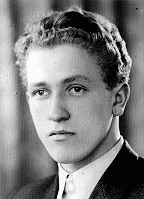You searched for: 澳门威尼斯人网址【手动输入∶___bet126.net___】最新地址请收藏,澳门威尼斯人网址是多少,澳门威尼斯人全部网址,澳门新威尼斯人的网址,澳门威尼斯人网址玩法,澳门威尼斯人网址44,澳门威尼斯人开户网址。
<< Previous | Displaying results 391-400 of 430 for "澳门威尼斯人网址【手动输入∶___bet126.net___】最新地址请收藏,澳门威尼斯人网址是多少,澳门威尼斯人全部网址,澳门新威尼斯人的网址,澳门威尼斯人网址玩法,澳门威尼斯人网址44,澳门威尼斯人开户网址。" | Next >>
-
Edit Gruenberger
ID CardEdit was the second of three children born to Hungarian-speaking Jewish parents in the city of Kosice in the southeastern part of Czechoslovakia known as Slovakia. She grew up a Czechoslovak citizen. As a young girl, she attended a Jewish elementary school. Her father was a tailor whose workshop was in the Gruenbergers' apartment. 1933-39: After Edit finished elementary school, she entered secondary school. The language of instruction was Slovak and Jews faced no discrimination until November 1938 when…
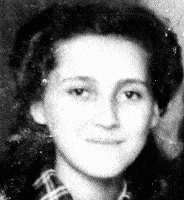
-
Jeno Brieger
ID CardJeno was born into a large, religious Jewish family in the village of Nagyhalasz in northeastern Hungary. The Briegers spoke Yiddish and Hungarian. After Jeno's mother died, his father remarried and the family moved to the town of Nyiregyhaza where his father owned and operated a hardware store. Nyiregyhaza had a Jewish population of 5,000. 1933-39: Jeno was the oldest son in a household of seven children. Nyiregyhaza was a rural town in which people still used horses and buggies. Jeno attended a…
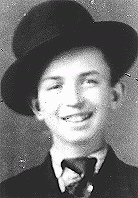
-
Gyula (Gyuszi) Brieger
ID CardGyula was also known as Gyuszi. He was born into a large religious Jewish family in the village of Nagyhalasz in northeastern Hungary. The Briegers spoke both Yiddish and Hungarian. After Gyula's mother died, his father remarried and the family moved to the town of Nyiregyhaza, where his father owned and operated a hardware store. Nyiregyhaza had a Jewish population of 5,000. 1933-39: Gyula was the second oldest son in a household of seven children. Nyiregyhaza was a rural town in which people still used…
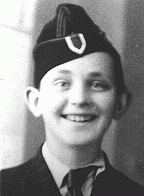
-
Bernard Krakauer
ID CardBernard was one of seven children born to a German-speaking, Jewish family in the small Moravian town of Mikulov in the central part of Czechoslovakia. The family later moved to the town of Hodonin where Bernard opened a dry-goods and clothing store. In 1899 he married Berta Koselova, and the couple had six children. During World War I Bernard served in the Austro-Hungarian army. 1933-39: In 1938 Bernard retired, and since none of his sons wanted to take over the business, Bernard sold it. He, his wife,…
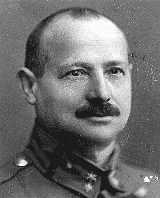
-
Berta Koselova Krakauerova
ID CardBerta was born to a Jewish family. Orphaned when she was a child, she was raised by her Uncle Poldi in Vienna. In 1899 she married Bernard Krakauer, a Jewish businessman from her hometown of Mikulov. As was the custom for orphans, Berta wore a black dress at her wedding. The couple settled in the town of Hodonin, where Bernard opened a dry goods and clothing store. They raised six children. 1933-39: With their children grown, Berta's husband retired in 1938. He sold the business and moved with Berta and…
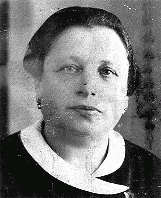
-
Hildegard (Hilda) Krakauerova Nitschkeova
ID CardHilda was the youngest of six children born to Jewish parents in a small Moravian town, where her father ran a dry-goods and clothing store. Her family spoke both Czech and German at home. Hilda was a tomboy when she was growing up, and competed on the Maccabi swim team. She attended a public secondary school in Hodinin, and wanted to pursue a career as a dental technician. 1933-39: In February 1933 Hilda moved to the Moravian capital of Brno where she attended dental school. On December 23, 1935, she…
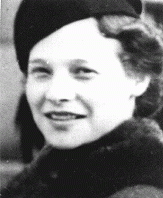
-
Moishe Rafilovich
ID CardMoishe was one of three sons born to Yiddish-speaking Jewish parents in Radom. This industrial city was known for its armaments factories, in which Jews were not allowed to work even though they totaled more than one-fourth of the city's population. When Moishe was young, he left school to apprentice as a women's tailor and eventually became a licensed tailor. He also played soccer for a local team. 1933-39: In 1937 Moishe, by then a master tailor, married another tailor's daughter. The couple had two…
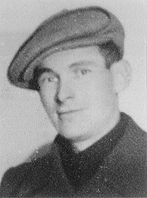
-
Irena Elzbieta Wos
ID CardIrena was the second of four children born to religious Roman Catholic parents in Poland's capital of Warsaw. Irena's father owned a successful textile business. When Irena was 10, her family moved to a comfortable apartment near the Royal Castle and the Vistula River. In 1930 Irena entered a private grade school. 1933-39: At 14 Irena began secondary school. She was a good student and wanted to be a doctor. On September 1, 1939, the day she was supposed to begin the new school year, the Germans attacked…
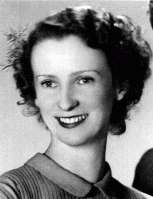
-
Pawel Wos
ID CardPawel, a Roman Catholic, fled to Danzig, Germany, in 1914 to avoid conscription in the Russian army. Since Germany and Russia were at war, Pawel was arrested by the Germans as an enemy alien and sent to work on a farm in northern Germany. He met Anna Szachowska there, and they married in 1918. The couple moved to Warsaw where they raised 4 children. In 1930 Pawel opened a textile business. 1933-39: Despite the Depression, Pawel's business prospered and they expanded their operations. In 1938 some friends…
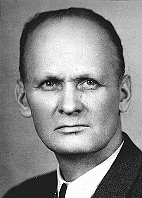
-
Odon Jerzy Wos
ID CardOdon was the third of four children born to Roman Catholic parents in Warsaw, Poland's capital. His father had worked for the Polish merchant marine before starting his own textile business in 1930. When Odon was 8, the family moved to a comfortable apartment located near the Royal Castle and Vistula River. In 1932 Odon began attending grade school. 1933-39: In September 1938 Odon began secondary school. Sensing growing danger from Germany, his father advised him to study German in addition to French. On…
